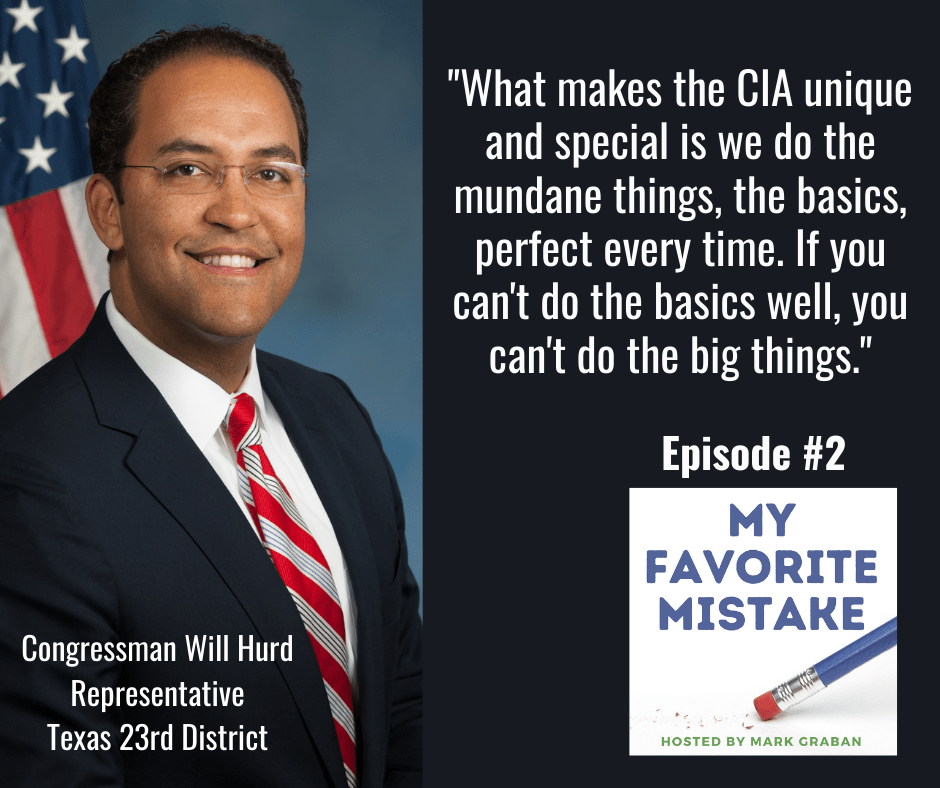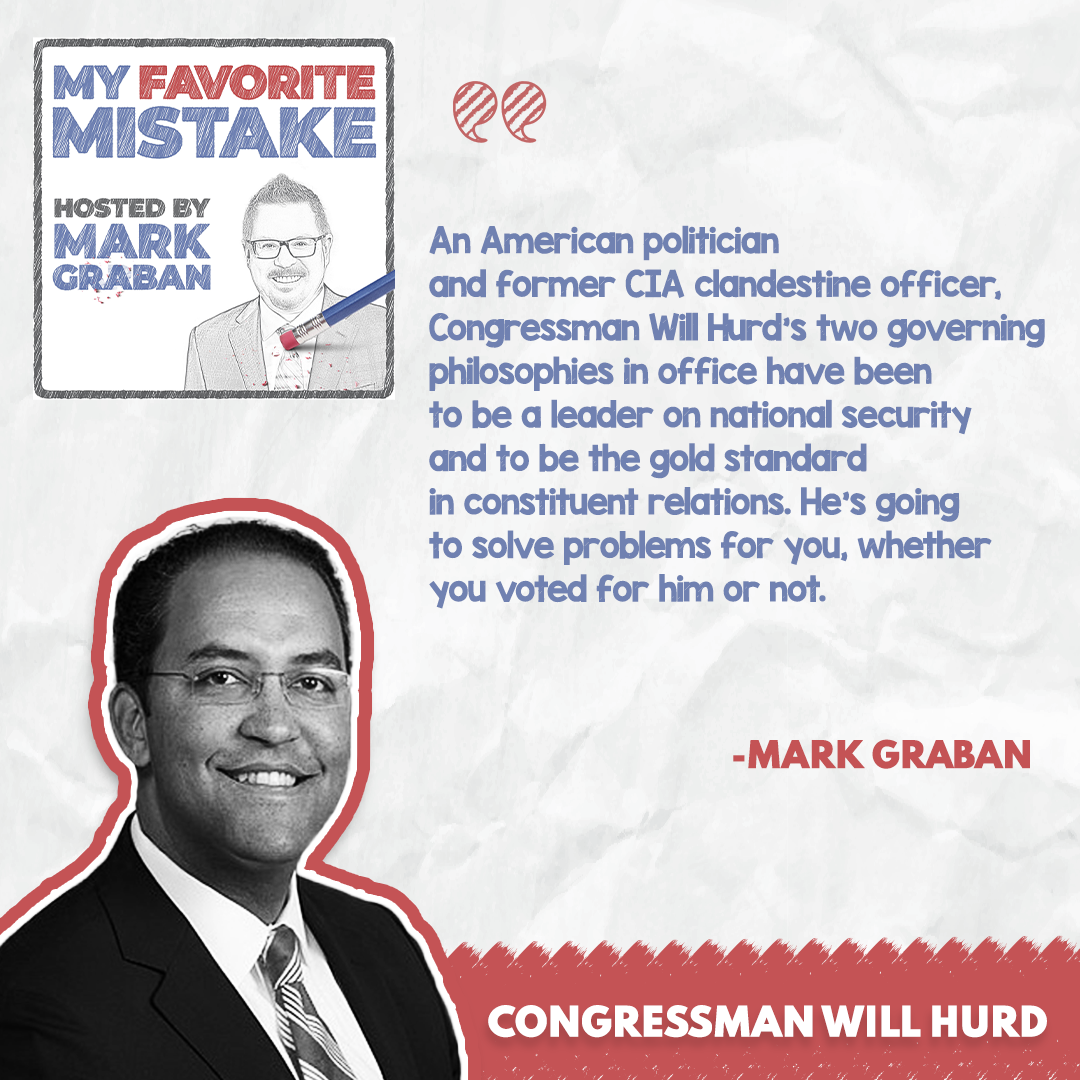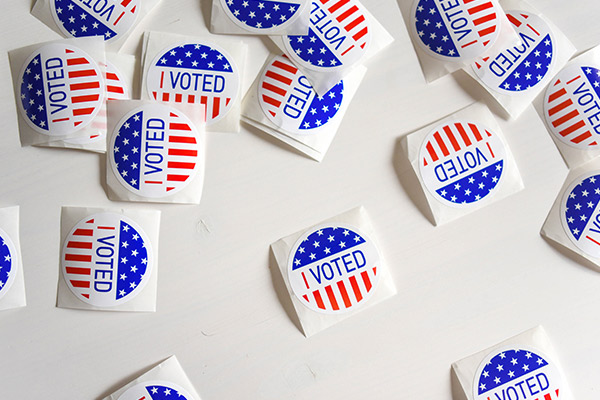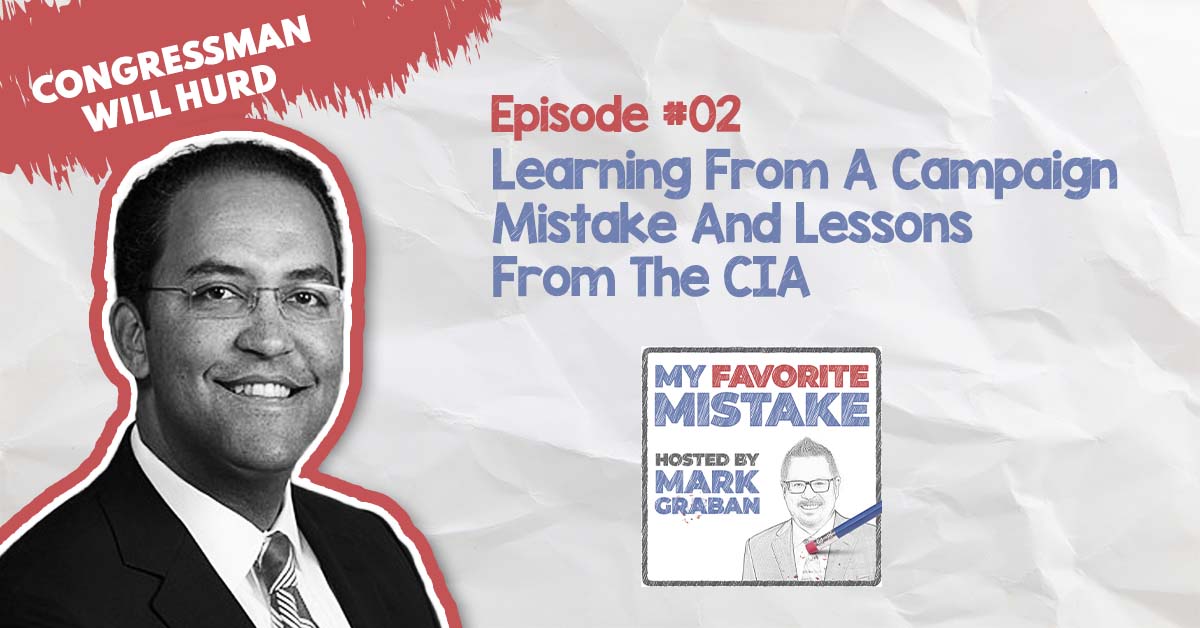Listen:
Check out all episodes on the My Favorite Mistake main page.
My guest for Episode #2 is not currently a business leader, but is returning to the private sector in January 2021. He is Congressman Will Hurd, a Republican representing Texas’s 23rd Congressional District.
Update June 22, 2023: Hurd has announced his candidacy in the 2024 Republican Presidential primary.
Hurd was student body president at Texas A&M University, and he served as a CIA undercover operations officer, including stints in the field in Afghanistan, Pakistan, and India. After working for a cybersecurity company, he was elected to the House in 2014.
Today, the Congressman talks about his “favorite mistake,” which includes the lessons learned from running and losing his first election in a runoff. We'll also hear about his experiences in the CIA and how they focus on training — and executing the mundane tasks perfectly — as a way to prevent bigger, catastrophic mistakes.
Update March 2022: Hurd is now the author of the book American Reboot: An Idealist's Guide to Getting Big Things Done.
Thanks for listening!

Watch the Full Episode:
Quotes:


Subscribe, Follow, Support, Rate, and Review!
Please follow, rate, and review via Apple Podcasts or Podchaser or your favorite app — that helps others find this content and you'll be sure to get future episodes as they are released weekly. You can also become a financial supporter of the show through Anchor.fm.
You can now sign up to get new episodes via email, to make sure you don't miss an episode.
This podcast is part of the Lean Communicators network.

Other Ways to Subscribe or Follow — Apps & Email
Congressman Will Hurd, Learning From A Campaign Mistake And Lessons From The CIA

I'm thrilled and honored to be joined by Congressman Will Hurd. He's a Republican, representing Texas's 23rd Congressional District. A little bit about his background: he was a Student Body President at Texas A&M University. He then served as a CIA’s Undercover Operations officer, which included stints in the field in Afghanistan, Pakistan, and India. He was elected in 2014. At the beginning of his third term, he announced he would not be running for re-election in 2020. Congressman, thank you so much for being here. How are you?
I'm great. It's a pleasure to be on this show. It is a great concept and I appreciate the opportunity to come on.
What was that on the campaign poster, “Doesn't make mistakes?”
It should have been, but no. This is a fascinating topic. I think we learn most from our mistakes.
Thinking back, what would you consider to be your favorite mistake?
I don't know if it was my favorite because I learned from it, but if I would've known in advance, I wouldn't have done it. It involves my first run for Congress in 2009. It was the race that I lost. To give some context to that, I never thought about running for office. I was in high school. I studied Computer Science at Texas A&M University. In my first year, I'm walking across campus and I see a sign, “Take two Journalism classes in Mexico City for $425.” I had $450 in my bank account, so I go to Mexico. I fell in love with being in another culture. I thought it was cool seeing things I only read about in books.
I added International Studies as a minor. In the first class, I took in International Studies. I had this former CIA officer tell the most amazing stories. That began my interest in the CIA. When I graduated, I went in. I was the dude in the back alleys at 4:00 in the morning in dangerous places, collecting intelligence on threats or homeland. I was stopping terrorists, nuclear weapon proliferators, and Russian spies. In addition to doing all that in places like India, Pakistan, and Afghanistan, I had to brief members of Congress. I was pretty shocked by the caliber of elected officials. My mama said, “Be a part of the problem or be a part of the solution.” I left a job that I liked and was good at. I moved back to my hometown and ran for Congress.
I think we learn most from our mistakes. Click To TweetI knew a guy who had run races all over the country. What I thought was that the number of votes that I needed to get was almost less than the number of votes I got at Texas A&M when I was student body president. The district at the time is 21 counties. Now, it's 29 counties. It's huge, basically 825 miles of the border. This was going to be a runoff. There were five of us in a runoff in the Republican primary. We were going to go on and try to challenge an incumbent. The leader of the pack in the Republican primary was a guy who had run in that seat before.
This was a 71% Latino district. Nobody thought a Black dude, let alone a Black Republican, would be able to win in a 71% Latino district. We said, “If we crush the vote count in all these other counties, Bexar County is the largest.” We did it. In the first round, everybody was shocked. They're like, “How did this guy who come out of nowhere win the first round?” I won that first round by about 900 votes, but I lost the runoff election. Neither one of us got 50% of the vote. I went to a runoff. I lost that runoff election because I made a strategic and a tactical error.
The strategic error that I made was that I viewed the runoff election as a continuation of the first election. It's completely different. It's a unique entity that requires unique tactics, techniques, procedures, and a different strategy. I saw it as a continuation. That was the strategic error. The tactical error I made is because I'm a classically trained engineer, I looked at all of the precincts. Counties are broken up into precincts. You can get the analysis of how many people voted for you or your opponent precinct by precinct.
I went and said, “Let's try to reduce the delta in the precincts that we lost, and if we reduce that delta, we're going to have more people come out to vote for us.” That was a tactical error, and it was my decision to do that. What we should have done was the way you win a runoff election is the way you win any election. ID your voters and turn them out. We did not do that in the runoff, and we ultimately lost by 700 votes.

What did I learn from that? I thought I wasn't going to run again because the guy who beat me went on to beat the incumbent. I thought he was going to be in office for ten years. That told me that when I ran again in 2014, my entire organization was built around identifying our voters and turning them out to vote. We have not done that. Now, my internal data is generally within half a percentage point of the final outcome of all of my elections. I'll be honest, it sucked. I felt like I let a lot of people down. I didn't know what my plan B was going to be after I lost. Those were two things that I learned.
Thank you for sharing that story. It sounds like those lessons are clear. When did that become clear? I imagine on election day and the days thereafter. When did you figure out then what had happened that you could learn from it?
Here's what I love about elections. There's a clear winner, there’s a clear loser, and there’s finality. It sucks being on the downside of that finality. However, after a few days, my team and I went and did an analysis county by county and precinct by precinct. The level of effort we spent in those areas where we were trying to reduce that delta, we did not see a significant change based on the outcome. When you compared turnout levels of the places we won in that first election versus those same precincts in the second election, you saw a dip. It was clear that the folks that had voted for me the first time, we didn't get them out to the polls.
Here's what generally happens in elections. The person in second place goes into a runoff, especially if it's a tie. If it's within 12 or 15 points, the second place wins the runoff 75% of the time because when you win, you take your foot off the gas. That was another lesson. It was probably a few days after. Part of it was the professional political class or the people that run races were advocating that we try to do it this other way, but I was the one that overruled them.
The second thing I took note of in your story was the way that you took responsibility for that decision as the candidate. We see a lot of times in organizations where there's finger-pointing or blaming. It might have been easy for some other candidates to tell that story and throw whoever consultant they used under the bus instead of admitting and taking responsibility for those. I appreciate that.
My name is on the flyer and my face is on the commercial. When I run commercials, I got to say, “I approve of this message.” I take responsibility for those. Had I gotten bad data, then I could have said, “There was some execution that was wrong,” but it was my responsibility for developing the strategy. It's also my responsibility to implement that strategy in the next round to ensure that there's an alignment of the values to what the strategy is.
You probably talk more to business leaders than you probably do politicians on these kinds of chats. This can translate into other issues. I was on a panel once with the digital director for The Rock, Dwayne Johnson. This was when the movie Moana had just come out. She had said, “If Moana fails at the box office, are you going to blame the moviegoers or are you going to say it's a crummy movie?” I think Moana is a fantastic movie. At that moment, if it would have failed, you would have said it was a crummy movie.
Politics is the only place where if somebody doesn't come out to vote, you blame the voter for not voting, rather than saying, “Are you offering a product that people want to come out and in essence, purchase or use?” That's why it goes back. That's connected to identifying your voter, just like a business will be identifying your customer and the person who you think should be consuming your good or service and go after them. I've also tried to take that philosophy into politics because usually in politics you look at historical voters like, “Who has voted? Who is the likely voter?” There are more people that don't vote than do vote. That's an opportunity, but you’ve got to give them something they want.
Politics is the only place where if somebody doesn't come out to vote, you blame the voter for not voting. Click To TweetI've talked to entrepreneurs who have fallen into the trap of talking to people about, “Would you buy this product?” That doesn't translate from a likely buyer into people voting with their wallets and taking that action.
You need that minimum viable product that you can get out in front of people so they can purchase and use it. When people are buying that, then add on additional bells and whistles. Those same principles and theories translate into politics. That's something that we've tried to do and why we've been successful electorally.
How many candidates run and lose in their first election, and then never run again because they get discouraged and feel rejected? How much, from your perspective, did that understanding of feeling like, “Here were errors that I made,” that these could be corrected and lead to a successful campaign as it turned out?
I don't know the raw numbers, but when I was first running, nobody expected me to win, but they all said, “You’ve got to run a few times before you're successful.” Most successful candidates and most that have electoral success have won, run, and lost before. It's rare that you win in your first round, then go into a second. My district is not unique in that. You can't have that in the back of your head when you're running. You're running because you think you can win, and you have a strategy to be able to win.

When you get that close like 700 votes, you can identify the things that you did poorly or did wrong, you find out a way to fix that, and then your team or the people you need to pull this off are willing to try one more time, that's when we ended up doing it again. The difference is the environment was a little bit different. The issues were different. However, structurally in how we built the organization, we weren't going to make the same mistake. My 2014 organization looked very different than it did in 2010.
You used the phrase minimum viable product, which comes from the lean startup methodology and so much of that methodology is about rapid learning, cycles of learning, cycles of iteration, A/B testing, and different messaging. I imagine there are candidates who have tried to apply that approach instead of coming up with the perfect messaging upfront somehow. I imagine there's a lot of testing, feedback, and iteration that occurs during a campaign cycle.
I use the term MVP because I've done a course and won a contest at a startup. This was after I ran for Congress for the first time between that and the fourteenth cycle. I tried to bring some of those philosophies. When you're running for office, you got to articulate what are you for. “What you are for?” may resonate a little bit differently in one community to the next, but the same fundamental issue is there.

How I may explain my background as a former undercover officer in the CIA? You may test that to see what's best. My official title when I was in the CIA was I was an operations officer in the National Clandestine Service. When you test that, nobody knows what that means. That's how we came to say undercover officer because people understand what that means and it describes what it is, but that was technically not my official title.
You do those kinds of things to make sure that you resonate, but you can't completely change the message. People in the ‘80s tried to do that. You would say one different thing in a primary and a different thing in a general election. In the age of social media where everybody is recording stuff, you can't do it. That's what people hate. They hate people that are wishy-washy.
There are important lean startup lessons where the company is grounded in certain principles and within those boundaries, there can be minor pivots, which is different than what might be called flip-flopping in other circles.
In Congress, you have your official and the campaign office. We knew in the most competitive seat in the entire country that there’s almost going to always have tough re-elections. We knew what we had to do in the official office in the next two years in order to get the chance to run again. The promise that I made when I was running the first time is based on something I had heard throughout the district. People never saw their members of Congress. It was a big loving county and the second least populated county in the United States of America. Ninety-five people in the entire county, they never saw their member of Congress. I made a commitment that you may not always agree with me, but you're going to see me.
That was our brand promise when we ran the first time. When we won, we had to execute on that and make sure that we delivered. That's why the two governing philosophies in my office have been, “Be a leader on national security.” That's how people know me. That's what I know. That's what my passion is. Number two, “Be the gold standard in constituent relations. We're going to solve problems for you whether you voted for me or not.” Those were the two governing philosophies that we knew if we can execute, then we had a story to tell in the next election. Those folks that were ID-ing my voters, we could ID more people based on the things that we were able to execute when we were in office. I'm getting into the weeds here but this is how we have been successful.

It sounds like there are parallels between what we might call the voice of the customer in the business world and the voice of the voter. You were getting that feedback about what they want. I assume them saying, “We never see our Congress person,” meant they wanted to see them.
Ultimately, showing up is 70% listening and hearing these concerns. Whether it's a community in San Antonio where all the San Antonio Spurs live or a Colonia in the Western part of my district where people don't have sewage, some of the issues are ultimately the same. People want a roof over their heads, food on the table, and the people they love to be healthy and happy. When you talk about those things and you show that you can deliver on those areas, then people don't care what little letter is after your name as long as you're helping their community. That's the same whether it's delivering a product or a service.
I'm curious about your time in the CIA. It seems like in that environment, mistakes could certain certainly be deadly for yourself or others. I'm curious what in the CIA training or mindset helps to try to avoid deadly mistakes while learning from smaller mistakes?
It's the training. The CIA is a high-reliance organization where a mistake has catastrophic results. It’s similar if you're a firefighter. The way we ensure we understand that is through our training. What makes the CIA unique and special is we do the mundane things or the basics perfectly every time. If you can't do the basics well, you can't do the big things, whether it's something like doing a surveillance detection route. If you're going to meet someone who's giving you secrets, you got to make sure that you don't have surveillance. It's laborious and time-consuming, but you do it with the same level of intensity every single time. You prepare for those meetings at the same level.
What makes the CIA unique and special is we do the mundane things, the basics, perfect every time. If you can’t do the basics well, you can’t do the big things. Click To TweetThe mundane things are taken as serious things. That's drilled into you in training. You realize and understand that when you're out in the field and your leadership communicates that. As a first tour officer, I had a senior officer that put his arm around me and helped train me almost in an apprentice-master craftsman type of relationship. You had an operations chief, chief of station, and everybody drilled in. I would ask questions about those mundane basic things because that's what keeps you safe. That's what protects other assets.
For me, and even in my organization now, it’s something as simple as answering the phone when a constituent calls. A lot of times, they may be angry or they have an issue you don't know, but that is the most important interaction that we have with the constituent. That has to be done perfectly every single time. Making sure the training goes in to do that is there.
Thank you so much for sharing not only perspectives from the campaign but from some of the mindsets in the CIA. Thank you so much for taking time out of your busy schedule to share your thoughts with us here.
I appreciate the opportunity. This was fun. I'm looking forward to listening to the other folks you interviewed.
Thank you.
Important Links
- Will Hurd
- https://www.KBTX.com/content/news/Congressman-Will-Hurd-reflects-on-time-as-student-president-during-bonfire-collapse-565089332.html
- American Reboot: An Idealist's Guide To Getting Big Things Done
- www.MistakesBook.com

